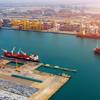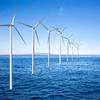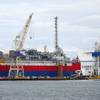Jordan Cove Approved for LNG Export
Terminal in Coos Bay, Oregon authorized to export Liquefied Natural Gas to non-free trade agreement countries
The U.S. Energy Department announced that it has conditionally authorized Jordan Cove Energy Project, L.P. (Jordan Cove) to export domestically produced liquefied natural gas (LNG) to countries that do not have a Free Trade Agreement (FTA) with the United States, from the Jordan Cove LNG Terminal in Coos Bay, Oregon. The Jordan Cove application was next in the order of precedence after the Energy Department conditionally authorized the proposed Cameron LNG facility. Subject to environmental review and final regulatory approval, the facility is conditionally authorized to export at a rate of up to the equivalent of 0.8 billion standard cubic feet per day (Bcf/d) of natural gas, for a period of 20 years.
The development of U.S. natural gas resources is having a transformative impact on the U.S. energy landscape, helping to improve our energy security while spurring economic development and job creation around the country. This increase in domestic natural gas production is expected to continue, with the Energy Information Administration forecasting a record production rate of 72.02 Bcf/d in 2014.
Federal law generally requires approval of natural gas exports to countries that have an FTA with the United States. For countries that do not have an FTA with the United States, the Natural Gas Act directs the Department of Energy to grant export authorizations unless the Department finds that the proposed exports “will not be consistent with the public interest.”
The Energy Department conducted an extensive, careful review of the application to export LNG from the Jordan Cove LNG Terminal. Among other factors, the Department considered the economic, energy security, and environmental impacts - as well as public comments for and against the application and nearly 200,000 public comments related to the associated analysis of the cumulative impacts of increased LNG exports – and determined that exports from the terminal at a rate of up to 0.8 Bcf/d for a period of 20 years was not inconsistent with the public interest.
The Energy Department said it will continue to process the applications currently pending on a case-by-case basis, in the order of precedence previously detailed. During this time, the Department will continue to monitor any market developments and assess their impact in subsequent public interest determinations as further information becomes available.
energy.gov












